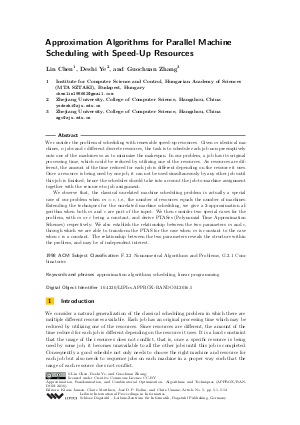Approximation Algorithms for Parallel Machine Scheduling with Speed-up Resources
Authors Lin Chen, Deshi Ye, Guochuan Zhang
-
Part of:
Volume:
Approximation, Randomization, and Combinatorial Optimization. Algorithms and Techniques (APPROX/RANDOM 2016)
Part of: Series: Leibniz International Proceedings in Informatics (LIPIcs)
Part of: Conference: International Conference on Randomization and Computation (RANDOM)
Part of: Conference: International Conference on Approximation Algorithms for Combinatorial Optimization Problems (APPROX) - License:
 Creative Commons Attribution 3.0 Unported license
Creative Commons Attribution 3.0 Unported license
- Publication Date: 2016-09-06
File

PDF
LIPIcs.APPROX-RANDOM.2016.5.pdf
- Filesize: 424 kB
- 12 pages
Document Identifiers
Subject Classification
Keywords
- approximation algorithms
- scheduling
- linear programming
Metrics
- Access Statistics
-
Total Accesses (updated on a weekly basis)
0Document
0Metadata
Abstract
We consider the problem of scheduling with renewable speed-up resources. Given m identical machines, n jobs and c different discrete resources, the task is to schedule each job non-preemptively onto one of the machines so as to minimize the makespan. In our problem, a job has its original processing time, which could be reduced by utilizing one of the resources. As resources are different, the amount of the time reduced for each job is different depending on the resource it uses. Once a resource is being used by one job, it can not be used simultaneously by any other job until this job is finished, hence the scheduler should take into account the job-to-machine assignment together with the resource-to-job assignment. We observe that, the classical unrelated machine scheduling problem is actually a special case of our problem when m=c, i.e., the number of resources equals the number of machines. Extending the techniques for the unrelated machine scheduling, we give a 2-approximation algorithm when both m and c are part of the input. We then consider two special cases for the problem, with m or c being a constant, and derive PTASes (Polynomial Time Approximation Schemes) respectively. We also establish the relationship between the two parameters m and c, through which we are able to transform the PTAS for the case when m is constant to the case when c is a constant. The relationship between the two parameters reveals the structure within the problem, and may be of independent interest.
Cite As Get BibTex
Lin Chen, Deshi Ye, and Guochuan Zhang. Approximation Algorithms for Parallel Machine Scheduling with Speed-up Resources. In Approximation, Randomization, and Combinatorial Optimization. Algorithms and Techniques (APPROX/RANDOM 2016). Leibniz International Proceedings in Informatics (LIPIcs), Volume 60, pp. 5:1-5:12, Schloss Dagstuhl – Leibniz-Zentrum für Informatik (2016)
https://doi.org/10.4230/LIPIcs.APPROX-RANDOM.2016.5
BibTex
@InProceedings{chen_et_al:LIPIcs.APPROX-RANDOM.2016.5,
author = {Chen, Lin and Ye, Deshi and Zhang, Guochuan},
title = {{Approximation Algorithms for Parallel Machine Scheduling with Speed-up Resources}},
booktitle = {Approximation, Randomization, and Combinatorial Optimization. Algorithms and Techniques (APPROX/RANDOM 2016)},
pages = {5:1--5:12},
series = {Leibniz International Proceedings in Informatics (LIPIcs)},
ISBN = {978-3-95977-018-7},
ISSN = {1868-8969},
year = {2016},
volume = {60},
editor = {Jansen, Klaus and Mathieu, Claire and Rolim, Jos\'{e} D. P. and Umans, Chris},
publisher = {Schloss Dagstuhl -- Leibniz-Zentrum f{\"u}r Informatik},
address = {Dagstuhl, Germany},
URL = {https://drops.dagstuhl.de/entities/document/10.4230/LIPIcs.APPROX-RANDOM.2016.5},
URN = {urn:nbn:de:0030-drops-66283},
doi = {10.4230/LIPIcs.APPROX-RANDOM.2016.5},
annote = {Keywords: approximation algorithms, scheduling, linear programming}
}
Author Details
References
- N. Alon, Y. Azar, G.J. Woeginger, and T. Yadid. Approximation schemes for scheduling. In 8th Annual ACM-SIAM Symposium on Discrete Algorithms (SODA'97), pages 493-500, 1997. URL: http://dx.doi.org/10.1109/SFCS.1975.23.
- J. Chen and A. Miranda. A polynomial time approximation scheme for general multiprocessor job scheduling. SIAM journal on computing, 31(1):1-17, 2001. URL: http://dx.doi.org/10.1145/361604.361612.
- A. Grigoriev, M. Sviridenko, and M. Uetz. Machine scheduling with resource dependent processing times. Mathematical programming, 110(1):209-228, 2007. URL: http://dx.doi.org/10.1145/361604.361612.
- K. Jansen, M. Maack, and M. Rau. Approximation schemes for machine scheduling with resource (in-)dependent processing times. In 27th Annual ACM-SIAM Symposium on Discrete Algorithms (SODA), pages 1526-1542, 2016. URL: http://dx.doi.org/10.1109/SFCS.1975.23.
- K. Jansen and M. Mastrolilli. Scheduling unrelated parallelmachines: linear programming strikes back. Technical report, University of Kiel, 2010. Technical Report Bericht-Nr. 1004. URL: http://dx.doi.org/10.1109/SFCS.1975.23.
- K. Jansen and L. Porkolab. General multiprocessor task scheduling: Approximate solutions in linear time. In Workshop on Algorithms and Data Structures (WADS'99), pages 110-121, 1999. URL: http://dx.doi.org/10.1109/SFCS.1975.23.
- K. Jansen and L. Porkolab. Improved Approximation Schemes for Scheduling Unrelated Parallel Machines. Mathematics of Operations Research, 26(2):324-338, 2001. URL: http://dx.doi.org/10.1145/361604.361612.
- R. Kannan. Minkowski’s convex body theorem and integer programming. Mathematics of Operations Research, 12:415-440, 1987. URL: http://dx.doi.org/10.1145/361604.361612.
- H. Kellerer. An approximation algorithm for identical parallel machine scheduling with resource dependent processing times. Operations Research Letters, 36(2):157-159, 2008. URL: http://dx.doi.org/10.1145/361604.361612.
- H. Kellerer and V.A. Strusevich. Scheduling parallel dedicated machines with the speeding-up resource. Naval Research Logistics, 55(5):377-389, 2008. URL: http://dx.doi.org/10.1145/361604.361612.
- J. K. Lenstra, D. B. Shmoys, and Eva Tardos. Approximation algorithms for scheduling unrelated parallel machines. Mathematical Programing, 46:259-271, 1990. URL: http://dx.doi.org/10.1145/361604.361612.
- H. Xu, L. Chen, D. Ye, and G. Zhang. Scheduling on two identical machines with a speed-up resource. Information Processing Letters, 111(7):831-835, 2011. URL: http://dx.doi.org/10.1145/361604.361612.
